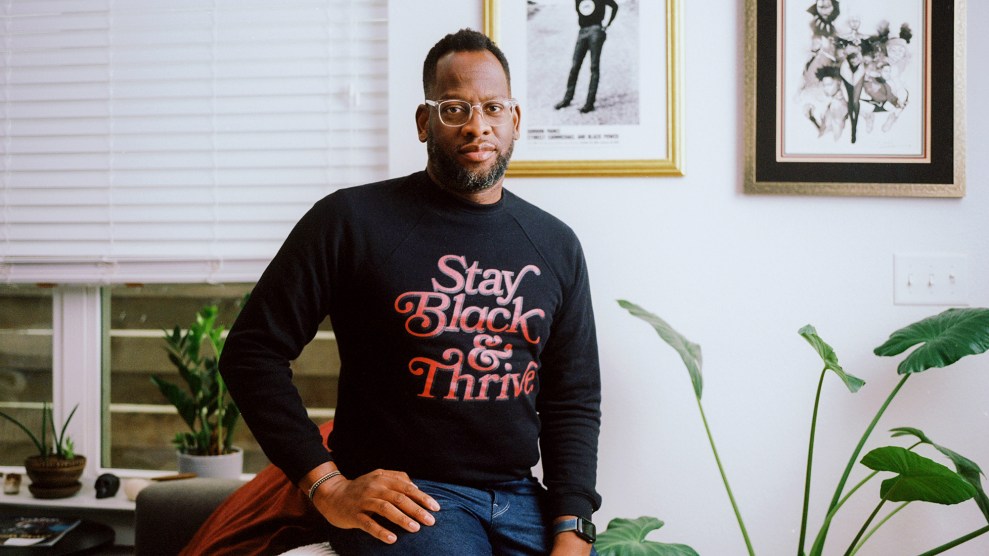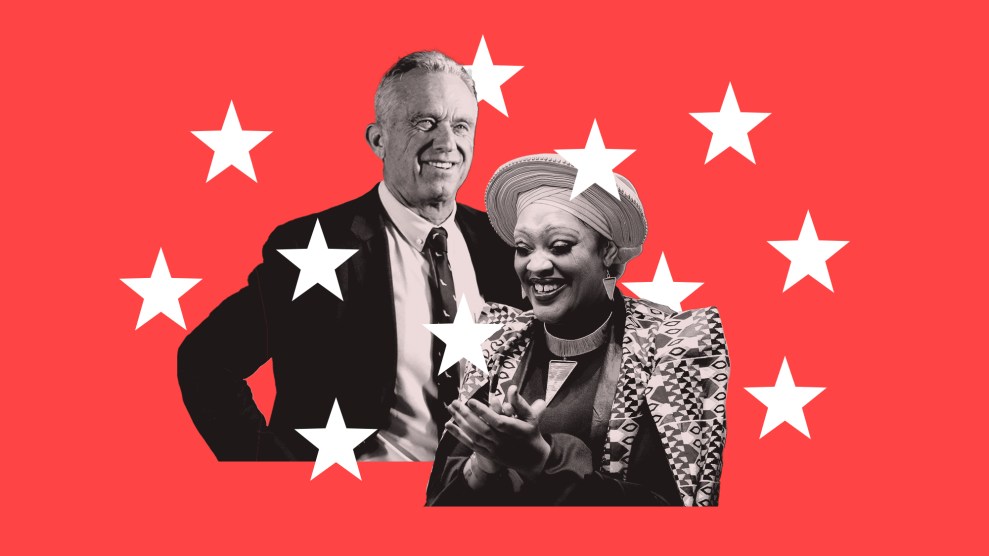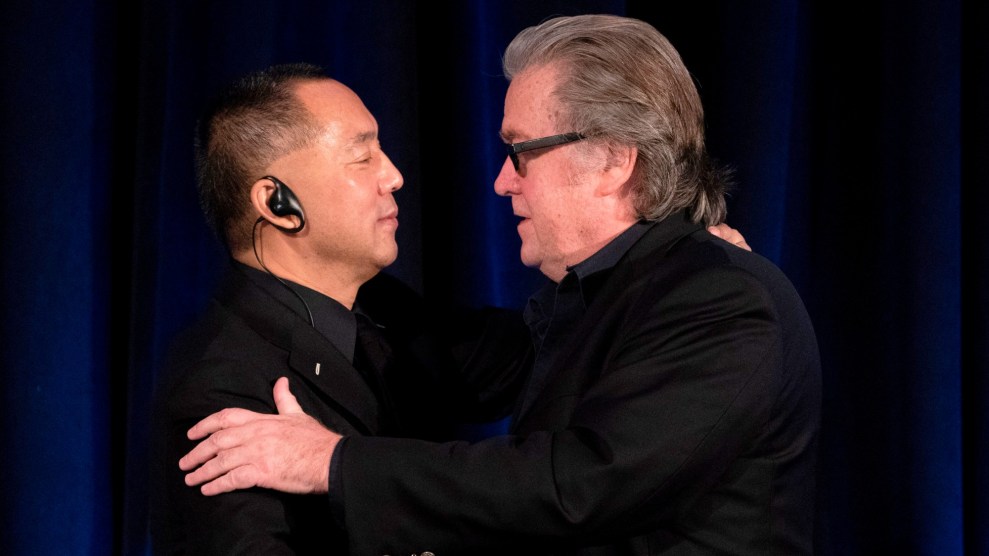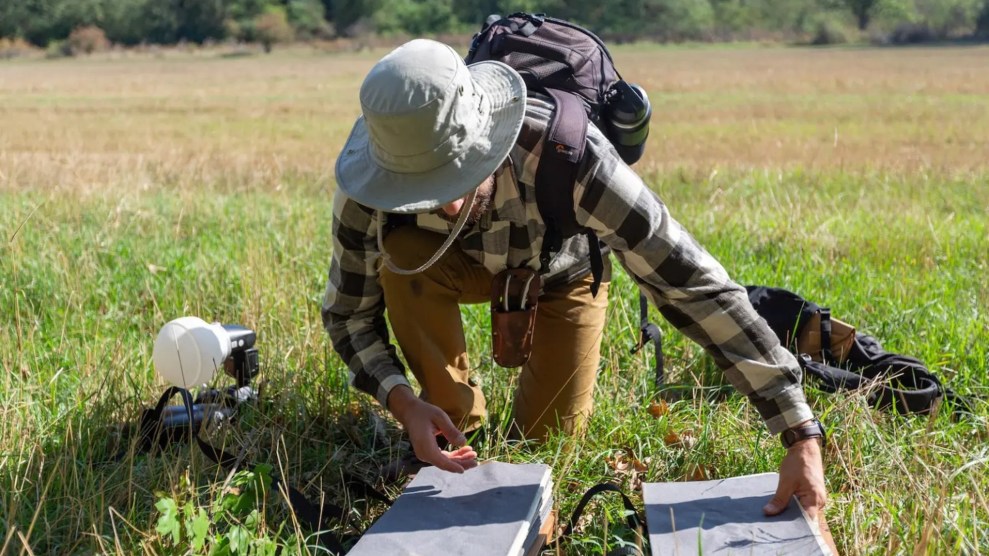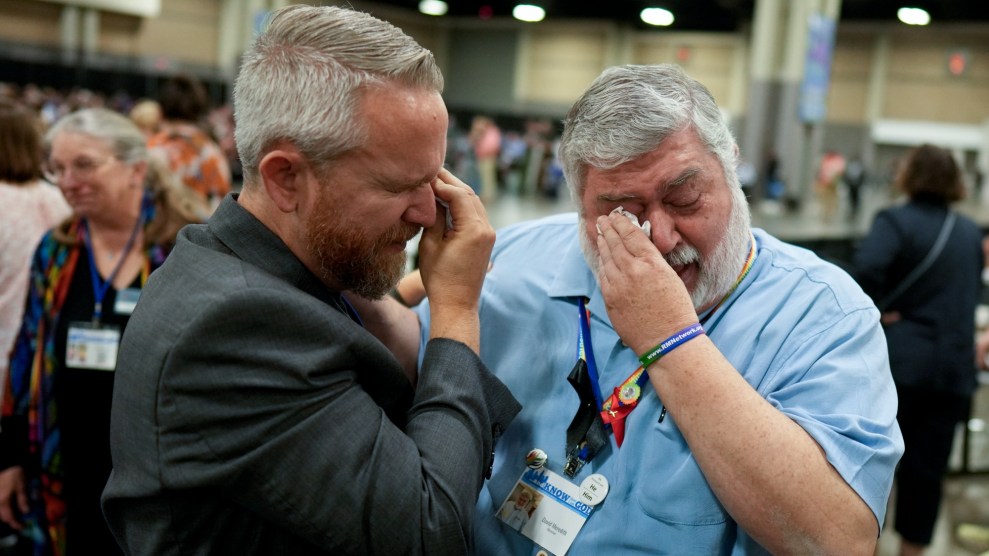You come to Mother Jones for journalism that is different.
Or at least I assume you do, because why else would you read a post headlined “A Different Way of Doing Things” if you weren’t interested in how we do our work? And that makes you the exact type of person I’m hoping to reach today.
I’m Brian Hiatt, and my job around here is focused on you: finding ways to connect with our online members and yes, asking you to support our nonprofit journalism a few times a year. It’s been a joy these last, wow, seven years, but enough about me.
This is about our team’s badass reporting, why it matters so much right now, and how powerful it is that a relatively small (compared to everyone we reach) group of committed readers like you have pitched in to make it all possible for 45 years now. And I want to keep it short and focused because we’re trying something different for our fall fundraising drive this year: seeing if we can raise $250,000 in a short and focused three-week window, by November 5, instead of what can often be a month-plus fundraising campaign. Here’s roughly how it’s going as of October 20:
- Total raised: $20,000
- Left to goal: $230,000
- Daily average needed: $11,905
- Current daily average: $4,000
- Brian’s take: A slower start than expected, banking on a strong finish.
- A link where you can pitch in: Thanks for asking!
So first, the badass reporting. It’s what we’re here for, we love doing it for you, and I wanted to highlight some of the recent work from my colleagues since that’s what we’re asking you to support during our short fall fundraiser.
I’ll start with Becca Andrews. For years she’s been reporting on religion, gender, sexual assault, and reproductive rights. She’s done amazing investigative work from the South, where she grew up and recently moved back to, and on the evangelical church, a community she was raised in. Her deep dives into a Tennessee lawmaker accused of sexual assault, on #ChurchToo, and on purity culture laid the groundwork for her most recent investigation: a major exposé that breaks open the alleged sexual misconduct at Moody Bible Institute in Chicago.
Nearly a year ago, some sources familiar with her work reached out, and she’s spent the time since digging into how Moody created an environment that enables abuse, shames survivors, and ignores accountability. Here’s how our editorial director Amanda Silverman put it when emailing Becca’s piece around to staff:
Stop whatever you’re doing and read this week’s Big Feature. It’s captivating and unsettling, and it’s sure to make your blood boil…
Becca spent the past, oh I don’t know, 100 or so months investigating allegations of sexual assault and misconduct at Moody Bible Institute, the “Harvard of Christian schools,” as one former student put it. She speaks with students who hoped they’d find their soulmates among their spiritual peers, but instead found abuse and shame. Yet this story is even more complicated—and Becca works to untangle the complex ways in which purity culture and the evangelical belief in complementarianism have enabled an environment of abuse, as well as an administration ready to sweep bad behavior under the rug. (The dean of students asked one woman, “What did you do to deserve to be hit?”) Of course, Title IX should provide some measure of accountability, but, as Becca writes, this is a far from a perfect system—even less so when the institution in question is a religious one.
And as Becca wrote when sharing her investigation with MoJo newsletter readers, it’s “a nuanced examination of patriarchy, purity culture, systemic abuse, and, more than anything else, individual strength.” It’s also the type of journalism Mother Jones was built to do and what you’ll be supporting if you can pitch in during our fall fundraising push.
The same day Becca’s investigation made waves, so too did an impressive reporting project that a whole team of journalists in our newsroom were working on for several months, helmed by our national affairs editor, Mark Follman. Mark was the first to track mass shootings in a public database, starting almost 10 years ago now, and he’s been one of the few reporters to focus on gun violence as a beat (that touches so many others, from extremism to domestic violence). He led our coverage that was among the first to sound the alarm about Trump cozying up to white supremacists before the 2016 election, and he’s stayed at it, having recently uncovered new evidence about the January 6 insurrection. Here he is breaking down the team’s big investigation from a few weeks ago and showing why discovering arsenals stockpiled near DC matters better than I ever could:
Like Mark says, Republican lawmakers and other Trump allies are trying to rewrite history. They’ve insisted that the mob at the Capitol had no guns. Our investigation shows otherwise in chilling detail (thanks to assistant digital producer Sam Van Pykeren’s fantastic video work).
It’s another great example of what makes Mother Jones different—focusing on important issues well before most in the media took them seriously. Mark was able to build up years of expertise and sources on extremism in all its forms because we’re funded primarily by readers, not the whims of advertising revenue or platforms, or at the mercy of profit-driven ownership. So, what do you think: Ready to support hard-hitting, truth-exposing journalism like Becca’s and Mark’s during our shorter than normal fall push? I hope so: publishing two signature MoJo stories, all in a day’s work.
There is perhaps no bigger story right now than covering American democracy itself and the brazen attacks on free and fair elections. And since my job here is highlighting what makes Mother Jones special and worth supporting, I’ve always loved this name-drop from Washington Post media critic Margaret Sullivan warning, before the 2020 contest, that the media wasn’t doing enough to avoid an “election day debacle”:
I don’t buy the argument that there are insufficient newsroom resources. After all, virtually every newsroom has at least some political reporters. And they often run in packs, producing scoop-oriented coverage that’s not much different from their peers at other networks or newspapers.
But there are precious few voting-beat specialists. Prominent among that rarefied group are Pam Fessler at NPR and Ari Berman at Mother Jones.
Covering an issue as important as free and fair elections—and doing it justice—is about more than any one individual story or reporter I might highlight for you, as perilous as many of the recent headlines have been.
What makes MoJo’s reporting shine is more foundational: The team on our “democracy” beat looks at the forces behind the headlines and reports on the systemic failures of and threats to democracy, from various angles, 365 days a year. That “systemic” part really speaks to me personally—I love that about our reporting. Voting rights and voter suppression, dark money and who’s pulling levers behind the scenes, disinformation and extremism—they’re all part of a well-coordinated effort to undermine democracy and they’re gaining steam. Let’s call it what it is.
Or not? More recently, Sullivan put her finger a fundamental flaw when it comes to media’s handling of these attacks on the core of democracy: “Mainstream journalists want…to defend themselves against charges of bias. So they equalize the unequal. This practice seems so ingrained as to be unresolvable.”
Eschewing false equivalence and rejecting bothsidesism when needed is not something Mother Jones has ever really had a problem with. Case in point: Here’s part of what Ari Berman, our senior reporter on voting rights from that first quote, wrote to readers recently talking about his work and asking them to support it:
Being funded by readers like you means I can give a damn, too—and not just dispassionately chronicle the brazen attacks on the foundation of our democracy as normal run-of-the-mill news…That’s the first big thing worth knowing (and repeating often) about the spate of anti-voting and anti-democracy legislation proliferating across the country. It’s not normal “partisan bickering.” Voter suppression, extreme gerrymandering, pushing lies about election results, they’re all designed to do one thing at any cost: preserve minority rule.
The way I see it, the most important dividing line in American politics right now isn’t between Democrats and Republicans; it’s between Republicans and democracy. And journalism that isn’t afraid to say that, like ours at MoJo, is one way we can push back against these attacks on the very core of our democracy.
Preach, Ari! And if you agree with Ari and me that journalism like our team’s is essential right now, please pitch in to help us raise $250,000 during our shorter than normal fall push.
I could keep on going—I’m so impressed by my colleagues’ work. But I promised to keep this short and I hope I’ve been able to show just a sliver of what makes Mother Jones’ journalism unique and hopefully worth supporting during our fall fundraiser.
Because I also have to brag on you, the folks who are reading this right now. It doesn’t take a Mother Jones investigation to know that a lot of people are paying less attention to the news since Donald Trump left office, or that the economics of journalism are seriously broken right now. I don’t envy our CFO, and I kid you not, just as I was starting to write this paragraph, I was trading messages with Khary Brown, our VP of sales and sponsorship, who recruited me to MoJo, and he said, I quote, “Yeah, I could just imagine the impact of traffic on your campaigns. Less eyeballs = less $.”
Enter the power of a relatively small group of committed readers I mentioned up top. That’s you.
Over the summer we wrote about how less traffic for news sites, including Mother Jones, can be good for democracy but is incredibly hard for those of us in the news business. We ran a big, urgent fundraising drive to finish the previous, pandemic-ravaged fiscal year and start our current budgeting year on July 1 stronger than normal. Everything felt so uncertain then. And so many of you stuck with us: Pitching in some $330,000 over the course of five-plus weeks and showing that even if traffic is down, the core group of committed MoJo readers is strong and has our back. Thank you so very much.
The hope right now is that we can manage to bring in a bit less than that—$250,000—in a lot less time. I’ve done some foolish things, and I hope this isn’t one of them. Nothing feels all the certain still, but I’m banking on you, our readers, already knowing the massive threats journalism and our democracy face right now, and the big generational change our society is undergoing that we often write about when asking you to support our reporting that exists to make a difference. We’ll save that for another day.
Because, just maybe, things are a little more settled right now, in October 2021, than they’ve been for a while. We know more about the big dangers ahead, and the big opportunities. (The places to block, as MoJo board member Rinku Sen says, and the places to build.) And I know that if you’re still reading this and turning to Mother Jones to help you make sense of all of that, you’re a critical part of our team, whether you can pitch in today or not.
But if you can, please support my colleagues’ impressive, impactful reporting with a donation during our shorter than normal fall fundraising drive. And if you’re able to, please do it soon so we can see if we can rally a lot of support in not all that much time. Here are those numbers again so you can see how it’s looking as of October 20:
- Total raised: $20,000
- Left to goal: $230,000
- Daily average needed: $11,905
- Current daily average: $4,000
- Brian’s take: A slower start than expected, banking on a strong finish.
- A link where you can pitch in: Thanks again for asking!



